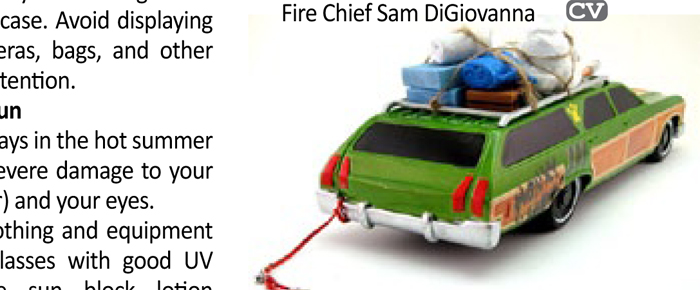
It’s summer time, and time for a vacation! Many of us may be ready for or planning a vacation for the summer months. Here are some safety tips to help make your vacation safe and enjoyable says Fire Chief Sam DiGiovanna. Vacation safety actually begins while you are still at home and begins with planning for safety!
Before You Leave
– Depending on the duration of your vacation abroad, pack sufficient medicines to meet any specific needs of your family members. You may need to bring along your family’s medical information, prescription medications etc.
– Inform your trusted relatives and friends of your itinerary so that you can be contacted for emergencies.
– If you leave your house vacated, you may want to stop or suspend all deliveries – an accumulation of newspapers and mail will attract the attention of would-be burglars. It is highly advisable to ask your trusted relatives, friends or neighbor to check your home regularly and collect mail and newspapers for you.
– Make sure that electrical appliances are unplugged, the gas supply is shut off, and the water taps (or supply) are tightly turned off.
– Clean out your wallet/purse before you go; take only essential credit cards.
– Pack things of value and great necessity such as medicine and jewelry in a carry-on baggage item that will stay with you.
– Discuss with your family members about the safety and security precautions described in this article. Set some essential safety rules for your kids.
When You Are In The Airport
– Do not put your carry-on baggage on the conveyor belt until you are clear to walk through the metal detector. There have been cases where the baggage was taken away by somebody (intentionally and unintentionally) while its owner was still being stuck in the queue.
When You Are Staying In A Hotel /Motel
– The first thing to do is to check out the exit routes and familiarize yourself with the evacuation procedures.
(For more details, please read the article “How to survive hotel fire” at http://www.ab.ust.hk/sepo/pdf/hotelfir.PDF
Driving In Other Countries
Driving in other countries can be very exciting and enjoyable, but it can also be potentially dangerous because we may not be familiar with the different traffic conditions, rules, signs, road markings, side of steering etc.
– Be wise with rental cars. Familiarize yourself with the controls and features of the car before taking the car out of the rental lot.
– If you do not have a mobile phone that operates in the country you are visiting, consider renting one for use in emergencies. Get to know what phone numbers to call in case of emergencies.
– Avoid prolonged driving. A fatigued driver is more accident prone.
– Be sure that everyone in the car is buckled up. Small children should sit at the back and be properly restrained in a child safety seat.
Touring Around
– Stick together with your family members and keep an eye on your kids all the time. Make sure that everyone knows where they are staying (name and address of hotel/motel). Teach them what to do if they get lost or separated. You may need to agree on a meeting place, just in case. Avoid displaying expensive jewelry, cameras, bags, and other items that might draw attention.
Watch Out For The Sun
The Ultraviolet (UV) rays in the hot summer sunshine can produce severe damage to your skin (possibly skin cancer) and your eyes.
– Wear protective clothing and equipment such as hats and sunglasses with good UV protection. Appropriate sun block lotion can provide protection from excessive UV absorption.
Food And Personal Hygiene
When you are travelling to less-developed countries, you need to be more cautious about food and personal hygiene.
– If you are suspicious of the water quality, avoid using tap water to brush your teeth, drink, or otherwise ingest (including ice). Instead, drink brand named bottled water (be sure the seal is intact when it is served). If you use local water, boil it for five to ten minutes.
– Avoid eating raw fruits and vegetables if possible.
– Eat well-cooked foods that are still hot. Be very cautious with seafood – especially shellfish that may have been caught in polluted waters. This can spread hepatitis and other food-borne
For additional safety travel tips discuss with your travel agent or visit: http://ezinearticles.com/?33-Travel-Safety-Tips&id=31670
Safe Travels!
Fire Chief Sam DiGiovanna











































